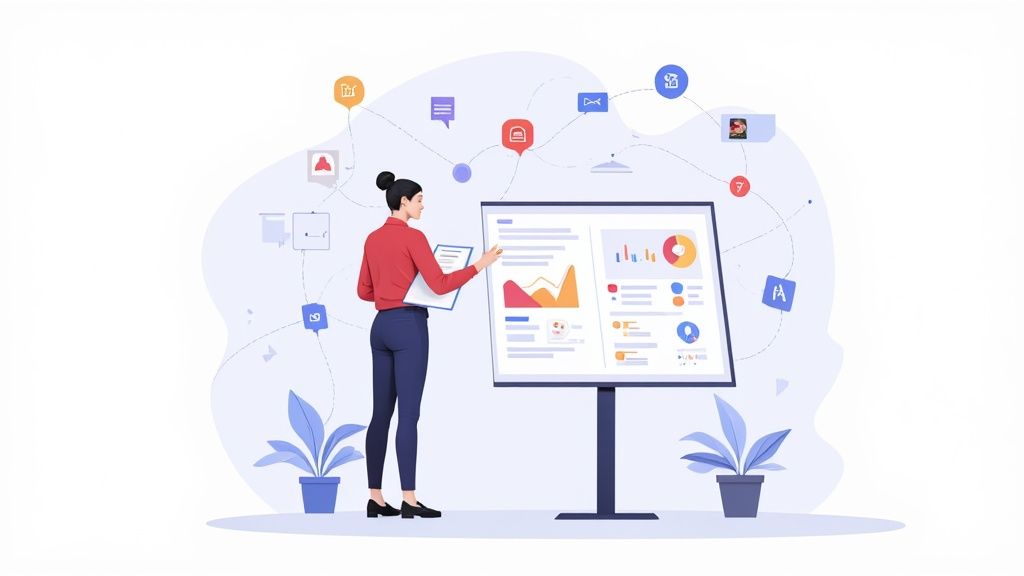Event management software is a digital toolkit designed to help you plan, organize, and execute events efficiently. Think of it as a central command center for everything from selling tickets and marketing your event to checking people in at the door and analyzing how it all went afterward. It’s built to replace the usual chaos of spreadsheets, endless email threads, and a desk full of sticky notes with one clean, streamlined system.
From Chaos Coordinator to Flawless Host
If you've ever planned an event, you know the dance. You're juggling a dozen different things at once. Tracking RSVPs in one spreadsheet, managing vendor contracts in another, trying to keep the budget updated somewhere else… it's overwhelming and a recipe for mistakes. This scattered approach eats up time you could be using to actually make the event a memorable experience for your guests.
This is where event management software comes in and brings some much-needed order to the chaos. At its heart, this technology is like having a super-efficient digital assistant. It automates the tedious tasks so you can finally focus on the bigger picture, bringing all those critical tasks together under one roof.
Transforming the Event Lifecycle
So, what does that actually look like day-to-day? A good platform gives you far more control over the entire event lifecycle with a lot less stress. The transformation usually shows up in a few key areas.
- Streamlined Registration and Ticketing: The entire sign-up process gets automated. You can create custom forms, securely process payments, and instantly send out confirmation emails without lifting a finger.
- Centralized Communication: Forget juggling different contact lists. You can keep attendees, speakers, and vendors in the loop with automated reminders, updates, and targeted marketing campaigns all from one place.
- Simplified Scheduling and Logistics: Building out a complex event agenda, managing venue details, and coordinating different session tracks becomes much simpler, with no more manual scheduling conflicts.
- Enhanced Attendee Engagement: The software provides a smooth experience that keeps your audience connected and involved from the moment they register until the final follow-up email.
The whole point of event management software is to pull all those fragmented tasks into one unified workflow. This doesn't just save a ton of time; it also dramatically cuts down on the risk of critical errors that happen when you're trying to manage information across a bunch of disconnected tools.
Ultimately, by taking over the repetitive, administrative headaches, this software lets you graduate from being a "chaos coordinator." It empowers you to be a flawless host, ready to deliver better, more impactful events with confidence.
Inside the Event Manager's Digital Toolkit
Let's pull back the curtain and look inside the digital toolkit that makes modern event management possible. These aren't just a random list of features; each component is built to solve a specific, real-world headache that event planners know all too well. It’s all about turning those manual, error-prone tasks into smooth, automated workflows.
At the heart of this toolkit are a few essential functions. Imagine an automated registration and ticketing system that completely eliminates manual data entry. Instead of fighting with spreadsheets, you get a clean, self-updating list of attendees the second they sign up.
This infographic breaks down the foundational features that form the backbone of most event management platforms.
As you can see, these systems are designed to work together, guiding the attendee from their first click to the post-event survey.
Core Components and How They Work Together
Beyond just getting people signed up, these platforms become your central communication hub. They keep everyone in the loop with automated reminders and last-minute updates, so you don't have to. Plus, intuitive agenda builders let you piece together seamless schedules without the nightmare of version control or conflicting session times.
This move toward all-in-one digital solutions is completely reshaping the industry.
In fact, the software side of things now dominates the event management market, accounting for more than 64% of the market share in 2024. This massive growth is being fueled by the need for cloud-based platforms that can do it all - from registration and marketing to sourcing the perfect venue. You can dive deeper into this industry shift by checking out the full research on Grandview Research.
But these tools don't just exist in their own little silos. Their real power is in how they connect and talk to each other. For instance, your marketing automation features can directly fuel ticket sales by targeting potential attendees with personalized campaigns. At the same time, integrated venue management tools can simplify the ridiculously complex logistics of booking spaces and wrangling suppliers.
The goal is to create a connected ecosystem where data flows smoothly between different functions, giving the event manager a single source of truth and complete control over the entire event.
Choosing the Right Tool for the Job
Not every event needs a massive, all-in-one platform. It's important to understand the difference between a comprehensive solution built for a giant conference and a specialized tool designed to do one thing exceptionally well. A huge trade show might need sophisticated exhibitor management, but a simple webinar series just needs dead-simple registration and follow-up emails.
It all comes down to matching the tool to the task.
The table below breaks down the main differences between these two approaches, which should help you figure out what makes the most sense for your event.
Comprehensive Platforms vs Specialized Tools
| Feature Area | Comprehensive Platform (e.g., Cvent) | Specialized Tool (e.g., Add to Calendar PRO) |
|---|---|---|
| Primary Goal | To manage the entire event lifecycle from a single dashboard. | To solve a specific problem exceptionally well, like boosting attendance. |
| Core Features | Includes registration, ticketing, venue sourcing, marketing, and analytics. | Focuses on a key function, such as our service's goal of getting events onto attendees' calendars seamlessly. |
| Best For | Large conferences, trade shows, and complex multi-day events. | Webinars, workshops, and any event where maximizing attendance is the top priority. |
Think of it this way: you wouldn't use a sledgehammer to hang a picture frame. Sometimes a small, precise tool is exactly what you need to get the job done right.
The Real-World Benefits of Adopting Event Tech
Let's move past the feature lists for a second. The real magic of event management software happens when you see its impact in the real world.
Picture an event manager drowning in manual tasks - juggling spreadsheets, endless email threads, and sticky-note reminders. Now, picture that same manager using a streamlined, automated system. The difference is night and day.
When you automate repetitive jobs like sending registration confirmations or payment reminders, you're not just saving time. You're freeing up brain space for the work that really matters, like crafting amazing content or landing that dream keynote speaker.
Boosting Engagement and Actually Measuring Success
It's not just about making your life easier, either. The right tools create a better experience for your attendees. Personalized email campaigns and interactive agendas make people feel looped in and valued from the moment they sign up. That positive vibe is what builds a great reputation for your events.
But here's the most important part: event tech finally connects your hard work to measurable results. By bringing all your data into one place, you can finally prove your event's return on investment (ROI) to the people who need to see it.
- Smarter Data Collection: You can easily track registration trends, see who's attending, and find out which sessions are the most popular. This is gold for planning your next event.
- Clear ROI Reporting: Generate reports that show stakeholders exactly how the event helped the business, whether it was through lead generation or direct revenue.
- Massive Efficiency Gains: Planners who embrace technology see huge improvements. Some studies show they can raise 20% more funds just by using the right platform.
The core benefit is shifting from reactive problem-solving to proactive strategy. With technology handling the logistics, you can focus on creating an unforgettable experience that drives real business value.
Even a simple tool can have a huge effect. For instance, using our service to let attendees add events to their personal calendars with one click is a game-changer for reducing no-shows. It’s a small step that keeps your event top-of-mind, boosts attendance, and demonstrates just how powerful smart event tech can be.
For more strategies like this, check out our guide on corporate event planning tips for success.
Who Uses Event Software and Why It Matters
Event management software isn't a one-size-fits-all tool. Think of it more like a specialized toolkit that different professionals pull from depending on the job at hand. The goals of a corporate planner wrangling a massive trade show are worlds away from a small business hosting a local webinar.
Understanding these different use cases is the key to seeing why this technology is so valuable.
For instance, corporate event planners are almost always under pressure to prove a tangible return on investment. They lean heavily on sophisticated features like lead capture for sponsors, advanced networking tools to connect attendees, and deep-dive analytics to measure every bit of engagement. For them, it's all about creating a seamless, professional experience that justifies a hefty budget.
From Corporate Planners to Non-Profit Champions
The list of who uses this software is broad and getting broader every day. While big companies historically drove the market because of their complex events, specialized agencies and smaller organizations are now major players. Many businesses now outsource their events entirely, which means third-party planners rely on these tools to manage intricate logistics for their clients. Discover more insights about these market trends on einpresswire.com.
This shift really highlights how adaptable the software has become.
- Small Businesses: A local marketing agency hosting a webinar needs simple, effective tools. Their priorities are easy registration, automated email reminders, and a straightforward way to create an RSVP link they can share across social media.
- Non-Profits: An organization planning a fundraising gala has a whole different set of needs. They need software that can securely process donations, manage volunteer schedules, and handle tiered ticketing for different donor levels.
When you look at these distinct scenarios, you see how the right platform is built to solve specific problems. It’s not about having every feature imaginable; it’s about having the right features for your event.
Ultimately, this flexibility is why event management software matters so much. It gives every type of organizer - from Fortune 500 companies to local community groups - the power to execute their vision more effectively, save precious time, and hit their goals.
What's Next for Event Management Technology
The world of event tech is moving at a breakneck pace, and the next wave of innovation isn't on the horizon - it's already here. Artificial intelligence (AI) has officially graduated from a buzzword to a practical, must-have tool in the event planner's kit. Planners are now using AI to map out personalized journeys for every single attendee and leaning on predictive analytics to get a real sense of attendance numbers long before the doors open.
This isn't just hype; the numbers tell the same story. The global event management software market hit around USD 15.5 billion in 2024. But hold on, because projections show it could balloon to USD 34.7 billion by 2029. That kind of growth shows just how quickly the industry is embracing more sophisticated platforms. You can dig into the full market growth projections on GlobeNewswire if you're curious.
The Evolution of Event Experiences
It’s not all about AI, though. The demand for truly seamless hybrid event platforms is only getting stronger. Organizers need tools that don’t just cater to in-person and online crowds separately, but weave them together into one connected experience.
Another big shift is the focus on sustainability. New software is helping planners track and shrink an event's environmental footprint, handling everything from minimizing food waste to figuring out the most efficient travel logistics for speakers.
Amid all these technological leaps, the simple, foundational parts of a great attendee experience are still what matter most. Even the smartest AI can't fix the problem of a missed event because it was never on someone's calendar.
This is exactly why core functionalities, like the ones our service provides, are more crucial than ever. Making sure your event reliably lands on an attendee's personal calendar is the bedrock for everything else. It’s the simple, non-negotiable step that ensures your audience actually shows up to enjoy the amazing, high-tech experience you've built.
For anyone looking to nail this critical first step, we believe that mastering event marketing automation is the perfect place to start.
Common Questions About Event Management Software
Even after digging into the features and benefits, you probably still have a few questions. That’s understandable. Let's tackle some of the most common ones that come up when people are trying to figure out where this kind of software fits into their world.
What Is the Difference Between Event and Project Management Software
It's a great question, because on the surface, they both seem to be about organizing things. But they’re built for completely different jobs. Think of project management tools like Asana or Trello as a general contractor's toolkit - fantastic for managing all sorts of tasks and deadlines across any kind of project.
Event management software, however, is more like a specialized surgical kit. It’s designed from the ground up for the unique, chaotic lifecycle of an event. It has tools you’d never find in a generic project manager, like attendee registration, ticketing systems, on-site check-in, and audience engagement features. It’s purpose-built for the very specific pain points an event planner faces.
Is Event Management Software Expensive
The cost can be all over the map, which is actually good news. It means there’s a solution for just about any budget. You can find plenty of platforms with free or low-cost plans that are perfect for a small webinar or a local community get-together.
On the other end, a massive corporate conference will need an all-in-one platform, and that can be a serious investment. Most providers use a tiered pricing model that scales with the number of attendees or the features you need. This lets you start small and grow your spending as your events get bigger.
How Do I Choose the Right Software for My Events
Before you even start looking at vendors, look at your own process. Where are the biggest headaches? Are you drowning in spreadsheets trying to manage registrations? Is your marketing falling flat? Or are you struggling to keep a virtual audience from tuning out?
The best way to start is by figuring out your most critical needs. Make a short "must-have" list, set a realistic budget, and then hunt for software that offers a free trial or a live demo. You have to see it in action.
Don't forget to read reviews from planners who run events like yours. Their real-world experience is invaluable for finding the right fit.
Can I Use This Software for Virtual and Hybrid Events
Absolutely. In fact, you almost have to. Modern event management software is now designed with virtual and hybrid in mind - it's no longer just an add-on. The best platforms are brilliant at bridging the gap between your in-person and remote audiences, making it feel like one unified experience.
To pull this off, you'll want to look for a few key features:
- Live streaming integration to get your sessions out to a global audience.
- Virtual networking lounges so remote attendees can actually connect with people.
- Engagement tools like live polls, Q&A, and chat to keep everyone involved.
This is how you make sure every single attendee, no matter where they are, feels like they’re truly part of the event.
Here at Add to Calendar PRO, we believe the very first step to a successful event is getting it onto your attendee's calendar. If that doesn't happen, nothing else matters. Our tools are built to make that one crucial step completely seamless, boosting your attendance and making sure all your hard work pays off. Discover how our service can help you connect with your audience today.



